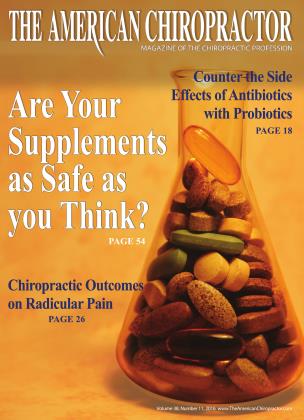Are Your Supplements as Safe or Effective as You Think?
FEATURE
Todd Singleton
Over a century ago, D. D. Palmer identified three causes of subluxation—trauma, toxins, and thoughts—giving rise to the chiropractic profession as we know it today. As a chiropractor who has been trained in this tradition, you probably preform dozens of adjustments each week to help patients heal from trauma. But, to rise above the competition, you must go a step further—you must offer help in the area of “thoughts” and “toxins” as well. Though there’s much to say about the influence of thoughts on the musculoskeletal health of the body, this article is going to focus on the ways that you can help a patient with the problem of “toxins,” specifically through supplementation.
Unfortunately, quality control of supplements is dismal in the United States. The FDA allows supplement manufacturers to water down their products with massive amounts of fillers, which makes many of the pills you find at the store practically useless. Standards are so low that the FDA allows products to pass quality control with up to two rat hairs in each batch! To make matters worse, supplements sometimes do not contain the ingredients that they claim on their labels. A recent review of supplements by New York’s attorney general revealed that many major retailers aie selling fraudulent and potentially dangerous herbal supplements. Amid all of this confusion, how can you tell whether a supplement will do what it says?
Look for Capsules, Not Tablets
One of the quickest and easiest ways to determine the quality of a supplement is by checking to see whether it’s a capsule or a tablet. Pressed tablets are extremely cheap to produce, but much less effective. The tablet-making process requires that herbs be diluted with 60-80% binders and then subjected to tens of thousands of pounds of pressure, creating a pill with the consistency of a rock. Because these tablets are so difficult to digest, doctors often see them show up on abdominal X-rays! If you see a supplement in tablet form, you automatically know that the manufacturer was more concerned with making a cheap product than a good product. Unlike these cheaply made tablets, vegetable-based capsules release their ingredients within min-
■ "The FDA allows supplement manufacturers to water down their products with massive amounts of fillers, which malees many of the pills you find at the store practically useless? ?
utes of consumption. Though a capsule won’t guarantee that a product is of high quality, it does indicate that the ingredients will be available for the body to use.
Look for Synergistic Blends, Not Single-Herb Supplements
Though single-herb supplements may be popular, they’re not as safe or effective as their multi-herb counterparts. In multi-herb synergistic blends, the dose of each individual herb is relatively low, but combined, the effects can be powerful. The combined ingredients support each other, making the final product more potent and more effective than any one herb would be on its own. As an added benefit, multi-herb supplements are much safer because they contain low doses of many different herbs, rather than high doses of just one.
Choose Organic When Possible
When choosing a supplement, look for brands that are organically and responsibly grown. Though you may (or may not) worry about pesticides on your spinach, you should be very worried about pesticides in your supplements. Once dried and condensed, the chemical residue from pesticides in supplements can far exceed anything you would consume from food. If you don’t know if a company is organic, just ask! You can find the contact information for many companies right on the supplement bottle.
Avoid Products That Use Fillers, Extenders, Binders, and Other Additives
If a supplement company uses fillers, extenders, binders, or other additives to make their product go further, you can be sure that they don’t have your patients’ best interests at heart. Look for companies that provide herbs in a pure, unadulterated form. Though such supplements aie raie because they’re expensive to produce, they aie absolutely worth the effort it takes to find them. Without unnecessary additives, a supplement can make an enormous difference in a patient’s overall health. Also, some patients may have an adverse reaction to some additives, which aie often made from com, wheat, or soy.
Buy from a Trusted Source
At the end of the day, you’ll have to buy from a company that
you trust. If you’re interested in a particular company, I highly recommend placing a call to ask about their standards of quality control. If their representative can’t tell you much about their quality-control process, it’s not a good sign! Companies that sell great products should be proud to share this information with you. If you can’t find someone to answer your questions, you probably shouldn’t buy from that supplement company.
If you follow these guidelines, you’ll be able to identify supplements that will really do what they say they will. Though it can take a little bit of research (and a lot of hard work) to settle on a supplement company you can trust, the results are well worth the effort. When you prescribe high-quality supplements in your office, your patients will get better results and report greater satisfaction with your care. This, in turn, will make your patients want to refer their friends and will make it easier to retain those patients for life. What could be better than that?
0Dr. Todd Singleton, D.C., is an author, speaker, and consultant who has been a practicing doctor for more than 20 years. He ran the largestMD DC PTclinics in Utah before switching to an all-cash nutrition model in 2006. He created a very successful cash practice in Salt Lake City and now spends his time consulting and visiting other offices all over the United States. Today, he ’s helped over 900 doctors implement awide variety of nutritional systems, rangingfrom simple plug & play protocols to full-fledged nutritional programs.
 View Full Issue
View Full Issue









